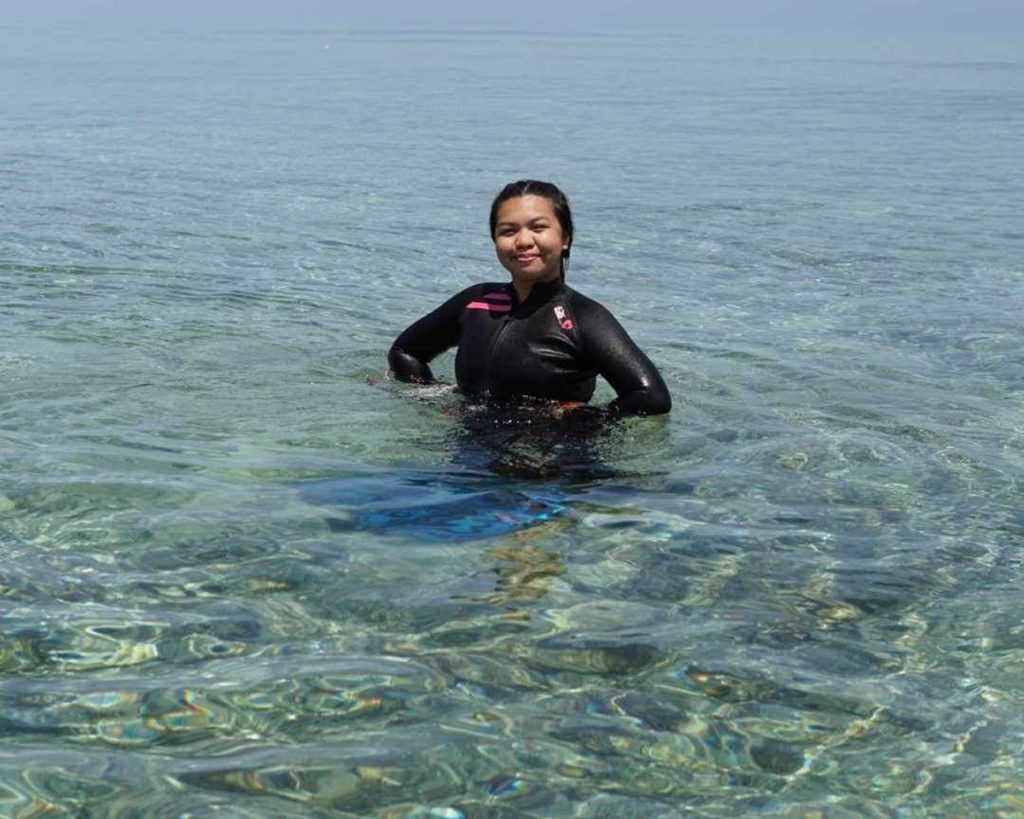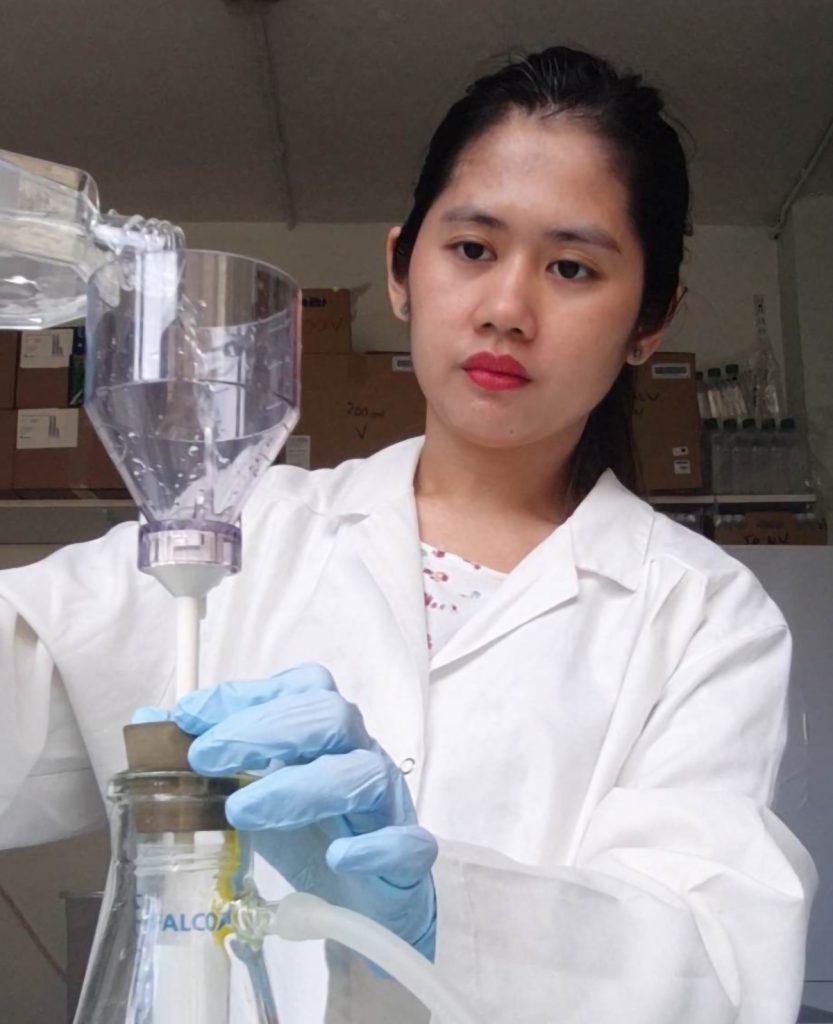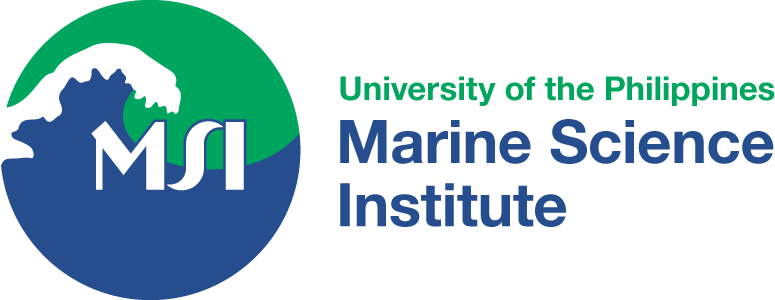Diving deep into the Marine Biology track
Written by Dorothy Andrada
Fish, corals, and seaweed are what usually come to mind when one thinks of the sea. The vibrant biodiversity beneath the waves is a core part of any ocean, and understanding this is a major field of study in marine science. Under the Marine Biology track of UP Marine Science Institute’s (UP MSI) Master’s (MSc) and PhD programs, students are taught how to explore underwater life: the different organisms of the sea, the various strategies they use for survival, and the ecological ties that connect them all.
This is the first in a three-part series on UP MSI’s academic specializations for graduate students.

Frau Calumpiano entered UP MSI with one goal: to study red seaweeds.
It was a love that was formed early on, when she was still a BS Marine Biology student at the University of San Carlos. Red seaweed was the subject of her undergraduate thesis, and what drove her to take a summer class at the University of Washington. Determined to delve even deeper, she emailed Dr. Wilfred Santianez and asked if he accepted students who wanted to study red seaweeds. Dr. Santianez replied with a list of species they could explore together. The rest was history.
How is her research journey so far?
“Medyo nakakapagod, as expected,” Frau laughed. “Mas masaya siya kasi included ang oceanography na courses, which hindi in-expound nung undergrad.” Biological Oceanography, a major for the Marine Biology track, was one of her favorite classes.
But it was the electives that Frau appreciated most. Her lessons in Population Genetics and Molecular Ecology and Evolution of Marine Organisms helped build her thesis, which explores the taxonomy of the red seaweed tribe Laurencieae through molecular phylogeny.
While she learns her theories in the classroom, she hones her laboratory and field skills on the job. Frau supports her studies by pulling double duty as a research assistant for the Marine Phycology Laboratory. Though it helps pay her tuition, this does mean she juggles classes with research work.
“Yung benefit is you really master the skills. Maganda siyang training,” Frau said. She already knew how to dive and collect samples, but it was at UP MSI that she learned how to make her own dive plans, optimize molecular experiments, and live on a boat for long periods of time. She also learned the logistics of conducting research projects, such as creating line-item budgets and filing for travel orders. Recently, she joined the research expedition aboard the M/V Panata, gathering biological samples in the West Philippine Sea.
Frau currently does work on taxonomy and systematics, but she hopes to branch out to other fields after finishing her Master’s. “Still focusing on seaweeds, of course,” she said. “But more in its all-encompassing role in ecology and evolution.”

Hired to work at UP MSI as a chemist, Mich de la Cruz initially took her Master’s just to fulfill job requirements.
It wasn’t until months after enrolling that she discovered what she wanted to do. In one of the seminars, Dr. Deo Onda — then only a recent addition to the faculty — introduced his field of microbial oceanography. As he talked about his research on the marine parasite Amoebophyra, Mich grew fascinated. She decided to leave the Marine Physical Sciences track and join Dr. Onda’s new laboratory.
The transition from chemistry to biology was not an easy feat. “Lahat ng nagagamit kong techniques and methods, dito ko talaga natutunan,” Mich said.
As a BS Chemistry graduate from UP Diliman, studying ecology and molecular biology was unfamiliar territory. But these were also the classes that Mich enjoyed the most. “Fun kasi makikita mo kung paano sila connected, yung biology, geology, at chemistry ng dagat,” she said.
This connection has remained central to her work. Similar to Frau, Mich funded her graduate studies by taking research assistantship roles for several projects. For this, Mich has collaborated with the Chemical Oceanography Laboratory and Physical Oceanography Laboratory. It was important that her project reports remained in context with larger ocean processes, and for that, she needed to learn from her peers just as much as her professors.
Mich even took the opportunity to travel abroad for her research. Through a grant from the UP Office of International Linkages, Mich did some of her thesis work at the Station Biologique De Roscoff in Sorbonne University, France.
Her hard work paid off. Last year, Mich earned her MSc in Marine Science. Her thesis centered on the parasitic activity of Amoebophyra on dinoflagellates, and its relation to the environmental changes brought by monsoons.
Mich continues to work in the Microbial Oceanography Laboratory. Her plan is to take a PhD and specialize further in marine microbes. “Marami akong nakikitang opportunities for marine microbial oceanography kasi bago siyang field, lalo na sa Pilipinas,” she said. “There’s a lot of work to do.”
Interested in becoming a mandaragat? Halina’t maglayag! Applications for our MSc and PhD programs for the 1st Semester, AY 2024-2025 are currently open. See more information in MSI Academics.
